#no jimmy here sorry
Explore tagged Tumblr posts
Text
hi wk fnadom.... take an wk au that is totally so original... (Me and @vitadiva01 's au) some of this is her art!!! :3










flops around on the ground like a dying fish
#wildkratts#wild kratts#wk#chris kratt#martin kratt#wild kratts aviva#aviva#wild kratts koki#koki#wild kratts chris#wild kratts martin#no jimmy here sorry#artist#art#artwork#digital art#whiteboard fox#whiteboardfox#art collab#with my wife#adanmwere ramblings#adanmwere art#fandom wk#zach varmitech#wild kratts zach#zach x chris#zachris#maybe#insanity#im indane sorry
45 notes
·
View notes
Text


finally put together a list of some hcs
#sorry no swansea i dont really deviate from canon for him…#i think swansea’s like 57 & listens to nickelback and thats like. the most i got for him outside of canon#feel free to suggest hcs or ask for interpersonal hcs btw :)#i have more hcs than what’s listed here#mouthwashing#jimmy#curly#anya#daisuke#jimmy mouthwashing#curly mouthwashing#anya mouthwashing#daisuke mouthwashing#my art#headcanons
4K notes
·
View notes
Text


maybe the mouthwash the coworkers we lost along the way
#sorry about the inconsistency of posts#lol#well here have some fanart#mouthwashing#anya mouthwashing#curly mouthwashing#jimmy mouthwashing#digital art
4K notes
·
View notes
Text

jiggy but with his card's hairstyle 🤩
#wasnt gonna post this here but whatever heh#not beating the jimmy liker allegations im. so fuckign sorry#mouthwashing#jimmy mouthwashing#zoup art
1K notes
·
View notes
Text

"I need someone to remember me
I need something bigger than the sky
Hold it in my arms and know its mine
Just how many stars will I need to hang around me
To finally call it heaven?"
#Im so sorry i forgot to post this here#mouthwashing#If you look really close you'll get to see that dead pixel#captain curly#anya mouthwashing#daisuke mouthwashing#swansea mouthwashing#jimmy mouthwashing#art#my art
2K notes
·
View notes
Text

got an urge to design ponies oops
#If people like this I'll do the rest of the life cast... No cutiemarks though cause Im really bad at those#geminitay fanart#pearlescentmoon fanart#jimmy solidarity#martyn inthelittlewood#scott smajor fanart#zombiecleo fanart#bdubs fanart#ethoslab fanart#impulse fanart#joel smallishbeans#he was difficult lol. I tried all sorts of green + brown (sometimes borderline red) colors but none felt quite right#so I just. made both the body and hair both green and brown. I think theres definitely a better design to be had here but I did my best#ldshadowlady fanart#Impulse ofc mostly inspired from that one skin where he has a beard#seeing people do fan designs for lifers is the only thing that gave me the urge to draw this#I wanted to see how much the colors could be played around with without making the ponies unrecognizable#and also like. pleasant to the eye. Again as if they could fit into the show itself#there arent a lot of skin toned ponies walking around equestria for a reason... it's uncanny unfortunately#that often makes fan ponies all follow the exact scame scheme of light body + dark hair#they get really indistinguishable so go wild!!!! mix things up!!!#sorry Im passionate about animal character design and ponies#tubby art
2K notes
·
View notes
Text

what if mouthwashing was a PRINTABLE board game..?
#mouthwashing#anya mouthwashing#curly mouthwashing#jimmy mouthwashing#daisuke mouthwashing#polle mouthwashing#polle the pony#swansea mouthwashing#sorry i didnt make operation real#but as it turns out the themes and iconography of mw can be applied to more existing board games#so if you (like myself) felt like mouthwashing had no gameplay.. here it is!#my art
864 notes
·
View notes
Text
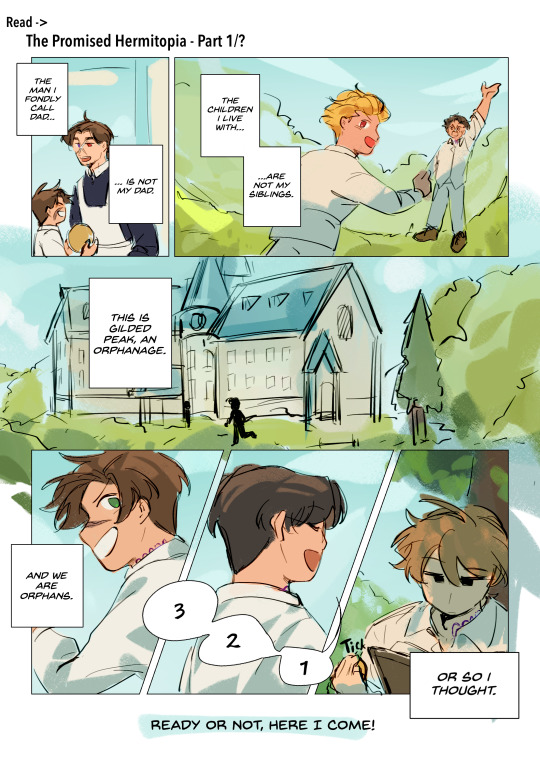
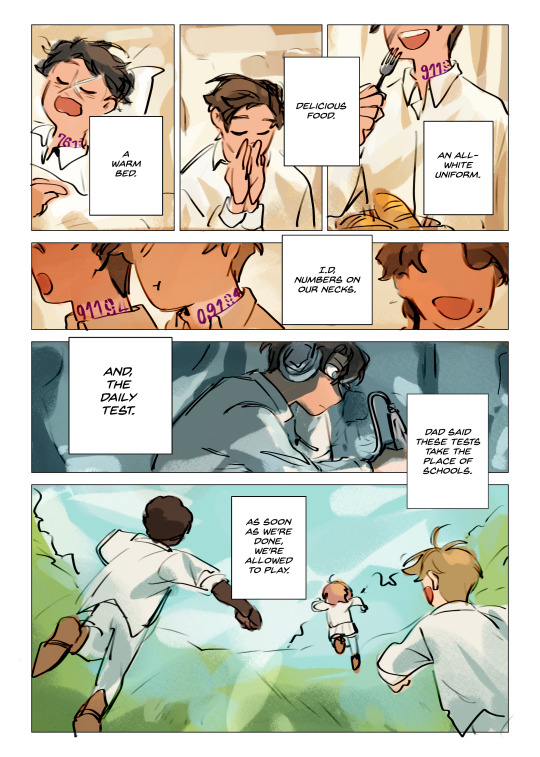
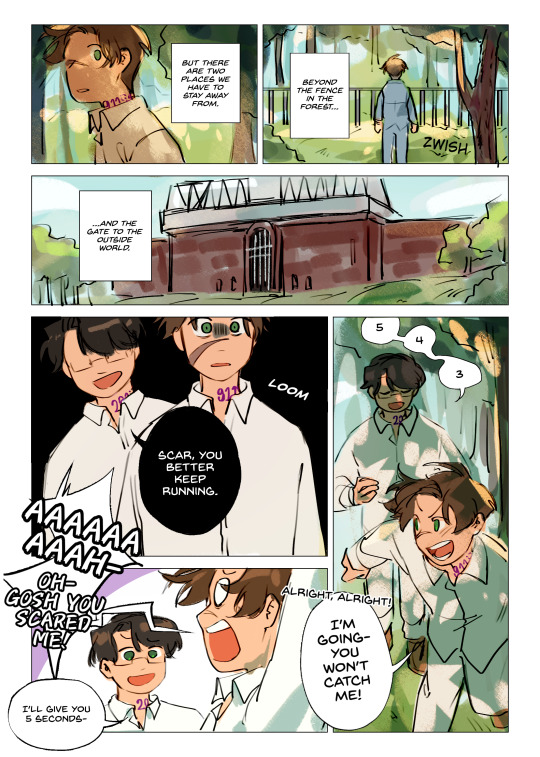

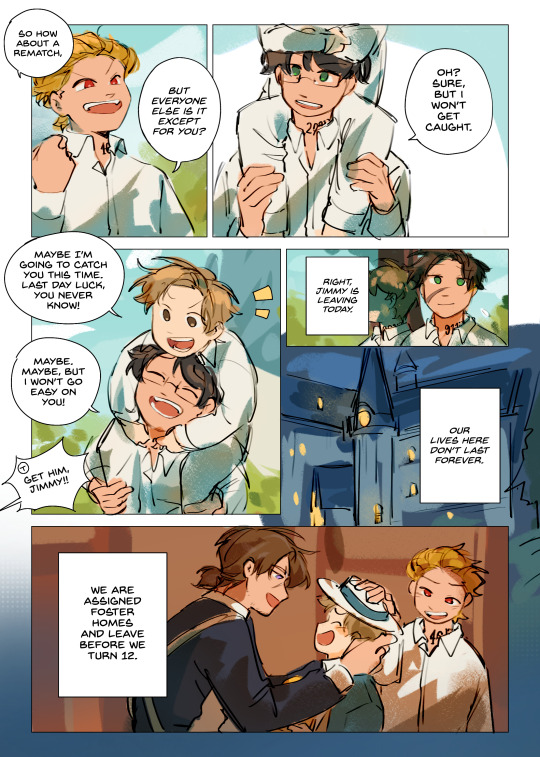
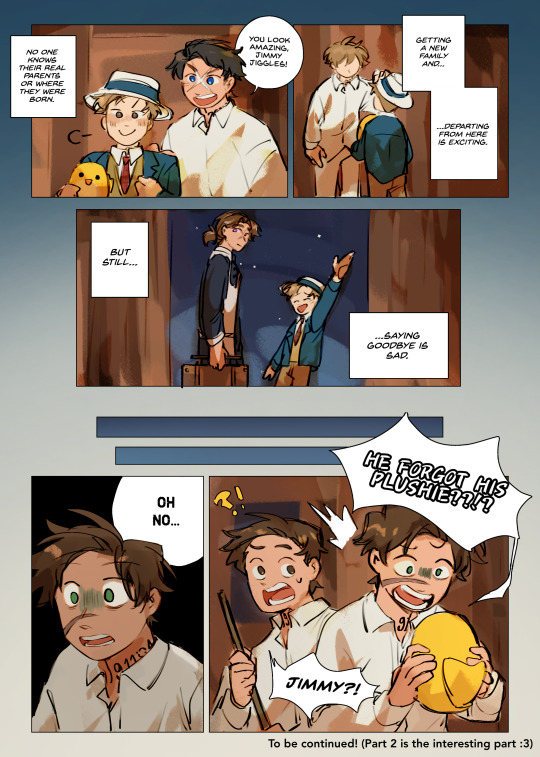

Part 1- The Orphanage
IT BEGINS WOOOOOOOO this was meant to inform ppl of the lore in tpn for the sake of the au then it got out of hand helpme
Designs | Part 1 | Part 2 (End)
#The Promised Hermitopia#dddaily4sherin#day 208 cherrysherin i hate ur guts /HJ#my art#comic#goodtimeswithscar#cubfan135#grian#featuring#xisumavoid#tangotek#impulsesv#skizzleman#jimmy solidarity#bigb is also in here#trafficblr#hermitblr#ignore that fact that the shading/coloring got progressively better the further u read idfk what happened HSJKADda#Also sorry that this honestly isnt really that interesting if you know the series already#like i mentioned its meant to set up the premise of TPN for our au so ppl who dont at least know whats going on#but then the comic got super out of hand ASJKDASKDJ#i guess ill just think of this as comic practice ig HELPMEEE#Hoping u guys still enjoyed though!! :D#posting this is actually so scary im dipping immediately after pressing post BYE
3K notes
·
View notes
Text
Daisuke’s Death and the Invisible Abuse of “Privileged” Children
tw: extensive discussions of child emotional abuse
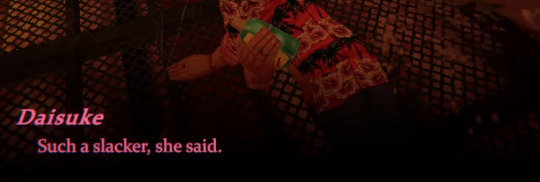
Another mouthwashing text analysis before I post any polished art? Shocker. But I really really appreciate the reception on my Swansea post, especially as a new account! This Daisuke-centric analysis is gonna be a quick one (< this was a lie. long read ahead!) but he is a character who resonates deeply personally with me as a victim of childhood abuse that resembled some of his experiences. I do plan on doing a larger analysis of his character, but the abridged version necessary for this piece goes as follows:
Daisuke’s treatment in the narrative—both his implied home life and Jimmy’s taking advantage of him to go into the vent—is another one of this game’s excellent portrayals of normalized (and thus invisibilized) abuse. Children are often cited as one of the most vulnerable classes of people, if not the most vulnerable (I acknowledge that Daisuke is not a child, but Mouthwashing implies that this narrative of his inadequacy has persisted throughout his upbringing and, to this day, he is dictated tasks and lacks independence, treated like a dependent. His youth is also an undisputed feature of his character and, most importantly, the cast treats him like a kid). Children’s dependency on adults and our willingness as a society to accept that the adults in their lives provide the most objective perspective on these young people renders them particularly prone to abuse easily swept under the rug or “justified” by wardens who possess the power to dictate the narrative. Jimmy’s engagement with Daisuke is an extension of the latter’s vulnerability. The co-pilot’s assertion that “he’ll be fine (…) mommy and daddy have him covered” at the birthday party represents a deference to Daisuke’s parents as adequate caretakers who will ensure his longevity and comfort on the basis of their wealth. And we know that Daisuke’s parents think the same—the Q&As reveal that they believe they are doing the best to secure their son a good future. However, the same Q&As indicate that they don’t actually engage with or understand Daisuke’s interests and that their approach to parenting him is entirely understood through their personal beliefs, not those of their son. And Daisuke clearly carries that quite close to his heart. He seems to struggle with identity and acceptance, seeking validation in the form of praise. Daisuke is defined through what he can do for others and not what he independently brings to the table, because that has never mattered where he grew up. The consequences of his parents’ failure to meet his emotional needs ultimately conditioned Daisuke to be perfectly available to be taken advantage of in a corporate setting defined by capitalist attitudes and hierarchies.
While it’s not concrete to say that Daisuke grew up in an emotionally abusive household, it is most important that we cannot dismiss the possibility and that his behavior as the outcome of some obvious degree of neglect is well-aligned with this theory. Moreover, the young man who comes out of that household is easily targeted by Jimmy’s abusive tendencies as a direct result of what he internalizes growing up. Daisuke is apparently financially well-off (contextually we can’t be sure if Daisuke’s family is upper class, middle class, or somewhere in between), and with that comes privilege. Even the way he packs—multiple personalized outfits, entertainment devices, etc—reveal that he’s used to certain comforts and hasn’t yet acclimated to the harsh expectations of companies like the Pony Express. But, especially where young people are concerned, it is all too easy to allow this privilege to act as a curtain between abuse and the outside world. We can acknowledge the privilege that he undoubtedly enjoys and also recognize that it benefits his parents much more than it benefits him as a young person.
Emotional abuse is complex and extremely damaging and Daisuke *does* show symptoms of at least being constantly verbally accosted and emotionally neglected by his parents to the point of permanently warping his sense of self. It also generated his overreliance on authority figures to tell him how to keep himself safe in their world. His mother apparently insulted him to his face (“such a slacker, she said”, and being reprimanded for being too talkative [from the Daisuke teaser]), and a lot of his negative self talk (“total screw-up”, “fuck up”, etc) is reminiscent of how people define themselves by parroting what they are called after internalizing consistent externally-imposed definitions of their identity. While these are not surefire indicators of abuse and I am not willing to diagnose a situation as abusive purely predicated on these factors, the behaviors Daisuke exhibits as a result share many commonalities with those of victims of childhood abuse. In fact, just about every time Daisuke speaks about himself in Mouthwashing, he mentions his failures and his work. It’s not lost on me that the teaser for the whole character is him pondering his mother and how she might not recognize him if he isn’t noisy and obnoxious. He personally puts a lot of stock in their assessment of him as lazy and annoying, but nevertheless tries to accomplish learning through the internship. Furthermore, Daisuke takes on a lot of his mother’s pain, hoping she doesn’t blame herself for the negative things that happen to him (even though in the same scene he reveals that she’s the reason he’s on the stranded Tulpar at all), indicating that he has taken responsibility for the feelings of people in his life even when those people are not his to care for and even bear responsibility for his pain.
Now in young adulthood, Daisuke rarely seems to have any sense of self beyond his parents and his work aside from one-off quips about baseball and babes. It suggests that he has always had to prioritize his parents’ desires growing up to avoid being treated unfairly and even cruelly, stunting his self-discovery. In abusive situations, your understanding of safety and your pursuit thereof are radically impacted and we see this manifest in Daisuke’s continuing willingness to accept those in command as the pinnacle of safety over what one might consider logical, personal acts of self-preservation. He equates safety with obedience, and I contend that that equivalence suggests a lot about how his parents reprimanded deviance from their plans. And not to be that guy, but it is kind of outright cruel to dump your utterly inexperienced teenager-to-early-20-something on a 1 year, no contact, unsafe space voyage in a failing industry knowing that he doesn’t have the necessary skillset yet. That’s what his parents do when they aren’t satisfied with his progress, and it’s intense and disproportionate and alarming! Especially for the dependent! They toss him into the deep end of the corporate machine and insist he learns to swim in such an oppressive, stifling atmosphere. It’s no surprise that he drowns, especially when he himself can’t recognize this as an unrealistic expectation and tackles it with everything he’s got because his parents are theoretically always right about what he needs. I don’t think it’s a stretch to say that normalized emotional abuse from the home and how it maps onto a victim’s adult life is a topic Mouthwashing would endeavor to touch on, because visibilizing invisible abuses of power in heteropatriarchal capitalist schemes is arguably the central undertaking of the game.
I don’t think Daisuke has evil parents or anything, rather that what we accept as “good parenting” and “good mentorship” is often negligent with regard to emotional needs and can easily become a source of heavy trauma for the children and mentees if that emotional aspect is stretched too thin in the pursuit of success. Not all abuse is intentional, and the dev Q&As imply that Daisuke’s parents thought they were sincerely investing in his future. They cared, just not in the best way for his wellbeing. Because capitalism emphasizes the individualistic pursuit of success above all else, it’s no wonder that a parent would think that the best thing they can give their kid is an avenue to prosper financially. But in doing so, Daisuke’s parents deny him the opportunity to define himself, to experience agency, and to build up confidence. Effectively, they create a young man so vulnerable to abuse by higher-ups (a manifestation of abuse that is often intentional at the systemic level) that he decides to climb into that vent at Jimmy’s discretion under the pretense that he will make somebody proud. Because that’s how Daisuke has been raised to understand himself and his place—the presumed screw-up boy as a default, making you proud by doing the right thing, who has learned to pursue that achievement to avoid the condescension and disproportionate backlash (e.g. the internship itself) that comes with failure. Everything circles back to his parents’ expectations that he makes for a good worker. When the cocktail knocks Swansea out, Daisuke makes an offhand comment about getting a bad reference—even in the most dire of circumstances, he can’t stop thinking about their capitalistic expectations for his “good” future.
I find that Daisuke really is such a good subtle portrayal of how parents with resources can get away with emotionally stunting their children because we perceive their ability to put a roof over their heads, food on their plate, etc as adequate parenting and even a privilege for the child when it should be the bare minimum. Jimmy certainly buys into it, and even some of the fandom parrots that, really and truly believing Daisuke is some good-for-nothing kid who doesn’t try hard when all we see is him working, including climbing into the vents to try and help despite not being assigned the work (foam scene, not his death). I find this reception shows how inclined we are to accept those narratives of the privileged child’s inadequacy before we address the parent for not fulfilling a child’s emotional needs, which are just as important if not more than the material.
To wrap this up with a quick discussion of the symbolism of his death in the context of the emotional abuse of children (which is the reason I made this whole post but I can’t talk about this guy without going off): Daisuke getting so badly injured trying to do what’s right is a very physical manifestation of the suffering he was already going through. It is the pain of constantly people-pleasing and of holding it all in when he’s lashed out at. He gets injured at all in the pursuit of appeasing Jimmy and (theoretically) Swansea, both of whom he blindly trusts despite how they treat him because he has always been expected to just adhere to the adults with authority in his life. Being talked down to by them is not new and has never been a reason to question their judgement. Daisuke sees this as a product of his own inadequacy as implied by other people, and not of external cruelty. He was raised not to question the system for fear of repercussions.
Jimmy is perfectly situated to coerce him into a dangerous situation because Daisuke has never been taught to say no. The safest option for a scared child is to trust their mentors, and an adult Daisuke does just that. Even Swansea’s teachings of safety are dismantled by Jimmy’s tactical use of captainhood to break the camel’s back. Authority. Daisuke must always listen to authority. Jimmy knows the vent isn’t safe. Swansea tells him directly and he observes the foam incident (if from a distance). For as much as he acts like he cares about taking responsibility for Daisuke’s safety, his individualistic pursuit of “fixing” things manifests in Jimmy again taking advantage of a vulnerable person on the ship. Jimmy doesn’t reconcile Daisuke’s eagerness to help with lessons on safety like Swansea does, but rather uses it only when it benefits him. Daisuke is taught by his upbringing to accept this kind of treatment—for safety, defer to the leader in the room even if it hurts and you don’t want to do it (just like he didn’t want to be on the Tulpar in the first place).
Then, once the intern is out of the vent and mortally wounded, Jimmy applies the mouthwash (a product to be sold, hauled in the interest of the corporation) to “help” sanitize the wounds. But the sugar content negates medical utility and only worsens the pain. We can interpret this as the application of material privilege, “sweetness”, that wasn’t actually any help at all to solve the deep wounds left by emotional pains. Mouthwash rids you of the bad taste but doesn’t kill all the underlying germs. One could argue further that in this scene, the mouthwash is specifically representative of the Pony Express internship: a rare stepping stone in the corporate hustle gained through privilege and presented as a boon. Like the mouthwash, the internship is imposed on Daisuke to try and “help” him succeed and be better, but it only elevates the pain by irritating the wounds and ends in his agonizing demise. However, this fine-tuned comparison isn’t necessary to my point. I find the broad implications of the mouthwash as an antiseptic immensely representative of parents and caretakers who don’t seem abusive to the outside world but who are actually subversively hurting their children and ultimately conditioning them to be victimized by capitalist attitudes. Our deference to material comforts and corporate opportunities as indicators of wellness renders us blind to where caretakers fail to address the emotional needs of young people. At the end of the day, Daisuke is still killed by the values his parents have instilled in him. It’s always the “captain’s” (literal or figurative) orders that seal the deal and cut off any of his autonomous doubt or dictation (for example, his desire to listen to Swansea and not go in the vent). His parents’ symbolic and saccharine gestures mean very little in the scheme of creating a person who can survive the pressures of the “real world” when malicious actors (JIMMY.) and the capitalist enterprise as a whole bear down on the cracks of an emotionally taxing youth.

A/N: Maybe I’m thinking about all of this too hard, but the beauty of Mouthwashing is that I’m never quite sure that’s the case as this game feels so deliberate. Anyway, as somebody who has clinically diagnosed PTSD stemming from childhood, this has always been a really important analysis to posit and I finally found the time to put it into words. I feel like Daisuke as a symbol is often overlooked by the fandom. He’s enjoyed, yes, but not really broken down like the others are. That diminishing of his importance and his feelings about the situation also feels like a symptom of his age. But that’s neither here nor there—like I said, I believe I could do a much more in-depth analysis of Daisuke as a victim of subtle abuse but this will have to do for now. A lot of my major points have been made, anyway! Perhaps video format would be best for something longer-form. 🌺
#.txt 🌊#mouthwashing#mouthwashing analysis#daisuke mouthwashing#not tagging Jimmy but he’s mentioned here#mouthwashing game#oh my god this is so long I’m so sorry#I have an actual class essay to write but here’s daisuke mouthwashing I guess
538 notes
·
View notes
Text
I love memory fuckery in the life games bcus I’m obsessed with 3rd life Jimmy not caring about sexuality whatsoever because they’re in a death game and Scott loves him and he loves Scott and that’s all they need right now and for forever until they are inevitably done with this sick, rigged game. And then he wakes up on empires with a cod fish glued to his head and lasts around 3 minutes before he shouts ‘IM GAY???!?!?’ Out loud
#KDJSKJDKSJDKS#SORRY. UH#flower husbands#jimmy solidarity#solidaritygaming#I don’t think there’s enough Scott here to warrant a tag yeehaw#third life#3rd life#life series#traffic smp#trafficblr#mcyt#my posts
807 notes
·
View notes
Text
i genuinely think the people who insist the life series is scripted just don’t understand the difference between something scripted and something that’s been given a basic premise and directives that everyone involved in agrees to play along with for the bit. like, no, specific moments aren’t scripted, but there’s a reason the series isn’t just “best pvper wins” and it’s because they deliberately prioritise entertainment over pure skill because the same person winning every time just wouldn’t be fun.
like, for the most part they’re a bunch of drama kids who have been given the perfect playground to act out the shakespearian tragedy of their dreams (some more so than others) (hello rendog) and they’re given the tools and situation to do so but everything else is just improv. and they’re also just having fun like i think we should all remember they’re doing this to have fun with their friends and play on a server where anything goes and they can grief all they want and sometimes they’ll just make stupid mistakes like walking off the side of a diving board and dying because they were so miffed about losing to a best tower competition they forgot where the stairs were, or blowing themselves up with their own tnt trap because they placed one block in the wrong place.
also i think people forget just how generally predictable people are in general, like after five seasons you can definitely start to guess how people will behave because they’re just like that. joel is reckless and he likes to poke the bear, martyn is good at staying alive but not good at keeping hearts (the difference between winning limlife and going out early in secret life), scott is good at the social game and a formidable opponent but also terribly self sacrificial, bdubs will betray anyone he’s allied with if offered something good, etc etc etc
#anyway it’s all just silly fun and a lot of people take it too seriously#it’s also like. genuinely how would you script some of these moments#‘mumbo it’s important you place the fenceposts down here. they’ll come into play later’#chekovs fenceposts#‘joel the script says you have to lose all your lives this episode yeah sorry man but you’ll get some back later’#awkduahkduajdiaid#anyway i’m here for a gem or joel win next season#trafficblr#traffic smp#grian#mumbo jumbo#geminitay#smallishbeans#inthelittlewood#tangotek#scott smajor#bdoubleo100#rendog#life series smp#secret life#ethoslab#jimmy solidarity
1K notes
·
View notes
Text
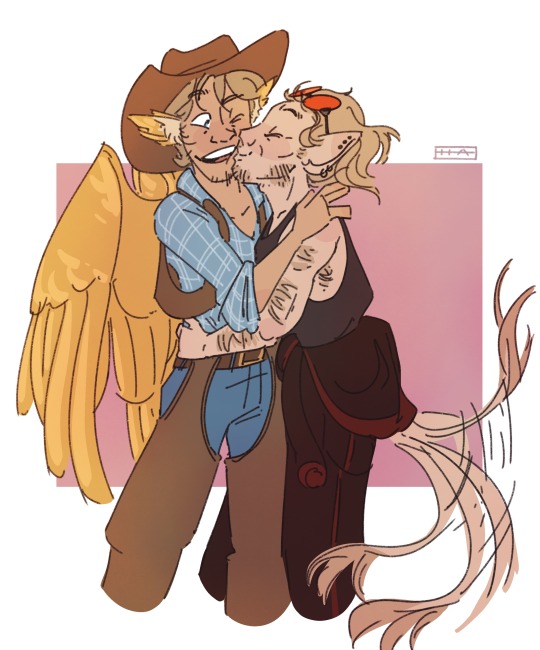
my rancher!!!
#trafficshipping#hermitblr#hermitcraft x empires#traffic light smp#traffic light series#traffic series#jimmy solidarity#tangotek#team rancher#rancher duo#solidaritek#solidaritygaming#tango tek#fanart#hermitshipping#tagging this is so hard#hermitcraft#minecraft yt#double life#this was supposed to be a sketch#and then it was two hours.#fuck#bitter content#anyway this is my make hermits not look like theyre 18 year olds propaganda#mostly for tango here tho#sorry jimmy your not beating the twink allegations#we like to have fun here
669 notes
·
View notes
Text
I would like to start this post by saying that I am not villainizing Jimmy. In my headcanon, he took Scott for granted, and that is a mistake that people make. It is forgivable with time and effort. People learn and grow and prosper, and it makes our relationships all the more meaningful to us.
Every time I think of Flower Ranchers, I think of Jimmy breaking up with Scott seemingly out of nowhere (that is how I translate Jimmy suddenly acting like he and Scott were never together after Third Life and refusing to say “I love you too” in Limited Life because cmon bro) and Scott moving out of their apartment.
Some time later, Jimmy and Tango are together, and they ask Scott to join them. He agrees, because why wouldn’t he? He still loves Jimmy, and Tango is wonderful, and Scott’s heart could be broken all over again without so much as a warning, but he will take that risk as many times as it takes, and that’s not healthy of him, but he can’t bear it any longer. Maybe seeing Jimmy and Tango together more intimately will tell Scott what it was that he did wrong.
They invite him back to their house for dinner and a movie. Of course he says yes. He has an anxiety attack the night before. Why did he say yes? He’ll have to see it all, now. He’ll have to see all of the ways Jimmy eradicated any and all evidence of him. He’ll be a stranger in this place he used to call home. He’ll be a guest to the man who his ex left him for, but Tango is trying so hard to accommodate for Scott because he’s Scott. He’s wonderful, wonderful Scott, and Tango loves him and Jimmy loves him too, and none of them know how to go about the healing process to this but they’re trying, so Scott has to try too.
He shows up that night, but only after hours and hours of overthinking every little thing.
Jimmy had replaced the oven that they picked out together. Scott used to love that oven. He baked their 1 year anniversary cake in that oven. When Jimmy was sick, he would make soup on its stove.
Jimmy changed the wallpaper in the master bedroom. Scott had picked out that wallpaper. Had Jimmy hated it the whole time?
Jimmy had removed the desk Scott hadn’t been bothered to take with him when he moved out. Scott’s initials were carved under that desk.
Jimmy had new mugs. They were Tango’s mugs. Tango’s mugs were sitting where Scott’s used to be.
Jimmy had candles in the bathroom cabinet. Scott didn’t recognize them. They were Tango’s candles.
Tango likes Scott’s old spot on the couch. Loathing the thought of bothering Tango in his own home, let alone so early in their relationship, Scott doesn’t say anything about it. He finds a new favorite spot on the couch. He never tells Tango about this, nor does Jimmy ever bring it up.
The bedsheets are different. That wasn’t a surprise. Scott probably would’ve been a little more disturbed if they weren’t different. Will they change again now that he’s here, or will Scott force himself to sleep under sheets that Jimmy and Tango had bought without Scott in mind? Would he be called overdramatic if he got emotional about bedsheets? He was so grateful to have been invited back into this home and into this relationship, but he was a visitor. He felt like he was one misstep away from becoming an intruder, something unwanted again.
The fridge’s contents are very different. Tango has a different diet. Scott becomes set on learning new recipes. The grip of the cooking utensils aren’t the same as the ones he used to have here.
All of the photos of Scott had been taken down. Again, not a shocker, but it made Scott teary-eyed. When he noticed, Jimmy and Tango were making dinner for him. He had gone to use the bathroom. He noticed the wall of pictures that used to be of himself and Jimmy was now covered in pictures of Tango and Jimmy. He was immediately distraught, but, more so, he felt so ashamed that he was distraught, that he hadn’t mentally prepared himself to find every picture of himself having been replaced. He doesn’t know how long he must have stood there, just staring at every picture. It was long enough that Jimmy came to check on him, but Jimmy ended up just staring at Scott in that hallway, neither of them knowing what to say. Scott would have cried - out of embarrassment or grief, he still doesn’t know - if he wasn’t already so ashamed of himself just for being there, even though it had been Tango and Jimmy who had invited him over. Even though he still didn’t know what made Jimmy pick Tango over him. Even though he doesn’t know where else in the world he would’ve been remotely okay with being at that night. Even though he, in all honesty, would’ve been more upset to have seen the pictures of him and Jimmy. He only knew that he was intruding. He didn’t belong there anymore.
The kitchen floor had been renovated. Did Jimmy hate the way it was before, or did he hate it after he had broken up with Scott? Did he not hate it at all and just found something better? They used to dance in that kitchen. Since then, he’s danced with someone who Scott assumed must be better.
Scott can recognize that there’s a smell to the apartment. Not at all a bad smell. It’s just one he hadn’t smelled here before. He doesn’t know if it’s a new smell or if it’s always been there, and he’s just no longer accustomed to it.
Jimmy got a new laundry basket. Surprisingly, it looks like something Scott might’ve picked out. It’s blue and everything. Scott wonders if Jimmy thought of him at all when looking at it.
Scott had designed a bookcase himself, and he and Jimmy had put it together. It had been too big to be moved into Scott’s new apartment, so he had to leave it in Jimmy’s. It’s gone now. Scott’s terrified to ask what happened to it. (He asks about it a year and a half into their relationship, when he’s more confident in their relationship. Jimmy startles at the mention of it, recalling how having it in his home stirred up too many memories of Scott. He had had it moved into his parents’ house. He gives them a call to ask for it back and surprises Scott with it a couple days later.)
There were some small things that, when Jimmy and Tango had invited Scott to try being a part of their relationship, Scott had thought about moving back into Jimmy’s apartment. He finds that many of them had been replaced. That makes sense, but it doesn’t make the ache in his chest feel any better.
Tango’s towels are where Scott’s used to be.
Scott’s succulents don’t sit on the windowsills.
The curtains are different. They had been yellow, before. They’re red, now.
Scott has never felt so embarrassed. He has no reason to be. He had been told to pick a movie, but he’s been staring off into space for who knows how long. Something warm is on his arm. It’s Tango’s hand, and, suddenly, they’re making eye contact. Tango doesn’t know how things are different. He doesn’t remember how things looked when he moved in. However, his pretty new boyfriend is distraught, and that is unacceptable. He holds Scott close. Scott doesn’t cry. He can’t. Tango had worked so hard for this to be a nice night for the three of them, and Scott wasn’t about to ruin it. He already feels like he has, but Scott would never forgive himself if he let Tango get tangled in the grief of Scott and Jimmy’s past.
Jimmy just watches them. He doesn’t know why he ended things with Scott. Scott had been wonderful. Scott had been everything, and then he wasn’t. Jimmy had gotten distant. He thought that maybe being with Scott had been too wonderful. Maybe the brightest stars really did burn out the fastest. But then he left Scott, and the look on Scott’s face had torn his heart in two. He left Scott, and nothing filled the void in his home, not even Tango.
Tango doesn’t prefer the same side of the bed as Scott.
Tango likes to shower in much hotter water than Scott did.
Tango doesn’t watch movies or shows in his spare time. The background noise of Scott’s shows while Scott cooked or cleaned or worked was gone.
Scott was a neat freak. Tango is an organized mess.
Playfully, Tango and Jimmy always argue over whether cats or dogs are better pets. Scott had always agreed with Jimmy that cats were better and that had been that.
Like Jimmy, Tango rolls his eyes at romantic cliches. Jimmy finds himself missing looking over and seeing Scott all starry eyed during cheesy romance movies. He wonders if he should’ve set up more cliches for them.
Tango is just as awkward as Jimmy is. He giggles and shrugs when Jimmy trips over his words in front of people. He’s as oblivious to pop culture as Jimmy is. Scott was never that way. Scott could smooth social interactions over for Jimmy like butter on toast. Scott could list ten facts about every celebrity Jimmy couldn’t so much as name. Scott’s charm and charisma was unmatched.
Tango can’t keep a cactus alive for five minutes. Scott practically had a garden in their home.
Tango and Jimmy tend to be pretty equally matched at games. Scott was always good at games, which meant he would sometimes let Jimmy win. Jimmy aches for it. He enjoys competing against Tango, but he yearns to look up from winning and cheering and teasing to see Scott staring at him silently with so much fondness that Jimmy would stop immediately. You just can’t tease a pretty man when he’s looking at you like he just watched you rip the stars from the sky, even if you both know it was him who allowed you to do it.
Tango flirts with Jimmy. He calls him teasing nicknames and will take on any excuse to call him “handsome”, but he never touches Jimmy during it. Scott was handsy. He would call Jimmy “handsome” while he adjusts Jimmy’s already perfectly fine tie. He would joke that Jimmy’s “attention seeking” while his hands were all over Jimmy’s shoulders. He would ask if Jimmy finds him pretty while he runs his hand down Jimmy’s arm. He would call Jimmy “Petal” with his nose pressed up against Jimmy’s jaw.
Jimmy takes down all of the pictures of Scott and puts them in a box. He doesn’t know if he’ll ever be able to bring himself to open it again. (He does, when Scott finally, and Jimmy means finally, moves back in. He opens it when Scott finds it during spring cleaning. Scott, voice breaking and eyes watery, admits that he never thought he’d get to see these pictures again, and Jimmy can’t say or do anything except press his lips to Scott’s temple and apologize for the millionth time. Some of the pictures get to fill frames again.)
Tango is fantastic. Tango is bright and fiery and loud and incredible, but Tango is his own person. He’s not Scott, and he’ll never fill the space that Jimmy had made in his own life. Tango just made more room for himself around the empty space in Jimmy’s heart. Tango is fire and Scott is ice and one can never do the job of the other and that’s how it always will be. Tango was energy and passion and warmth, and Scott was calm and soothing and refreshing. There was no comparing the two. There was no comparing anyone to Scott, because no one was Scott except for Scott. Why had Jimmy gotten so distracted?
He missed Scott. He missed his angel. He missed his snowflake so much.
Winter comes around, and it’s Scott’s favorite season. Tango comes home complaining about the cold, and Jimmy realizes that Scott was celebrating the season with no one that year for the first time in forever. He wants to throw up over the balcony.
Then, Tango mentioned that he might like Scott too, and it was an internal battle all over again, wondering when might be a good time to ask Scott out if there was any. Except, it was worse this time, because Jimmy had broken his heart. He couldn’t muster the courage to beg Scott to let him try again. Jimmy didn’t think he deserved a second chance.
But Scott did.
#trafficblr#smajor#scott smajor#smajor1995#jimmy solidarity#tangotek#trafficshipping#flower ranchers#angst#im sorry :(#implied happy ending though#jimmy is not being depicted as a bad person here#he just made a mistake and that’s okay#he learns and grows and that’s what matters#smajor centric mostly
222 notes
·
View notes
Text
hey mouthwashing analysts, do we maybe want to think a bit before comparing a full grown man, who is just heavily disabled, to a baby? like a literal infant? especially when there's a stronger metaphorical/psychological/symbolic avatar for the baby and pregnancy already present within the narrative? (multiple even!)
#please for the love of sweet christ stop treating or alluding to disabled characters as infantile. what is wrong with you#disabled people who need to rely on the care of others are not like babies. you guys know that right#also aside from it just being generally fucked up and weird#the possible metaphor of curly as anya's baby is very week. especially juxtaposed with the stronger symbols already associated with the#baby/pregnancy in the game (namely polle and the dead pixel; i actually prefer the dead pixel as being representative of jimmy)#also i just realized i spelt weak wrong. sorry im high#i also think curly's position is meant to be reflective of anya's. he's suddenly vulnerable#trapped. and at jimmy's total mercy (the physical assult 2 months in?)#very much in a similar manner to anya. only now- its too late for him to act. he can only witness as things fall apart#someone else on here said this but#curly and jimmy as foils- curly and anya as parallels#curly as a metaphor for the baby runs the risk of. muddying the whole thing#mouthwashing#mouthwashing analysis#captain curly#anya#jimmy
231 notes
·
View notes
Text

Hi im alive btw. I played snow day it was really fun and i love Jimmy and Henrietta...
#art#south park#fanart#jimmy valmer#henrietta biggle#south park snow day#snow day#sorry im not active here im on instagram 24/7
497 notes
·
View notes
Text

Bro moaned like a girl
#I didnt put in the ah in here because I am never writing that out sorry#yep#trust me though#anyways uhh#jimcurly#curly mouthwashing#Jimmy mouthwashing#mouthwashing#mouthwashing fanart
137 notes
·
View notes